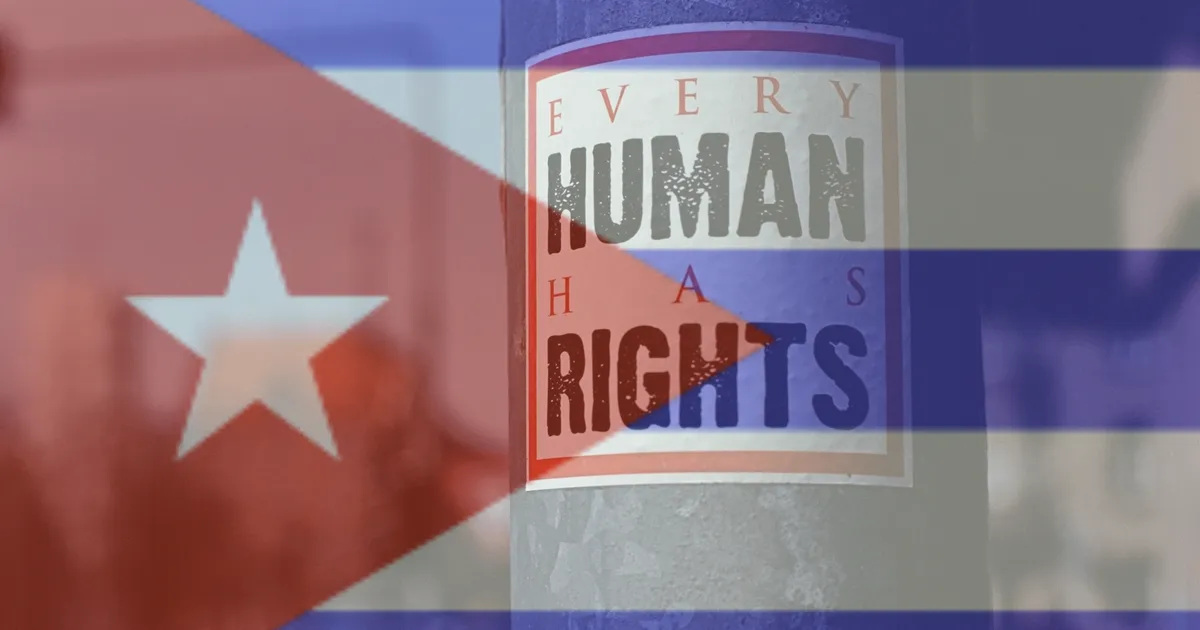Seventy-five years ago, on December 10, 1948, the United Nations General Assembly adopted the Universal Declaration of Human Rights. In 2008, in commemoration of the 60th anniversary of this important milestone, Mary Ann Glendon, United States Ambassador to the Holy See, highlighted Latin American and Catholic contributions to human rights, and made special mention of the contribution of Cuba that was documented in a diplomatic cable.
“The main leader of the Latin American group in 1948 was a young and charismatic Cuban representative named Guy Pérez Cisneros. His son, Pablo Pérez-Cisneros, attended the conference and recounted his father’s contributions to the UDHR, pointing out the gap between the Cuba of her father’s time and the deplorable state of human rights under the regime. current. The work of Guy Pérez-Cisneros and other delegates was captured in a 12-minute video presentation featuring archival footage of Eleanor Roosevelt and Guy Perez-Cisneros speech before the UN in support of DUDH”.
However, Pérez Cisneros was not the architect of the Universal Declaration of Human Rights, and until Washington Post journalist David Hoffman explored this chapter of Cuban history in his 2022 book, Give Me Liberty: The True Story of Oswaldo Payá and his Daring Quest for a Free Cubathis information was only available in some obscure archives and blogs.
Hoffman discovered that the 1940 Cuban Constitution, the Universal Declaration of Human Rights, and Article 88g of the 1992 Cuban Constitution that made the Varela Project possible were largely the result of a talented Cuban who throughout his career had been diplomat, jurist and scholar, but you have never heard of him. In fact, he has been called the “forgotten man”.
His name was Gustavo Gutiérrez Sánchez and he was born in Camajuaní, Province of Santa Clara, Cuba on September 20, 1895and died in exile in Miami on July 17, 1959 at the age of 63.
In 1916, when he was barely 21 years old. of age he had obtained doctorates in Civil and Public Law, and became Assistant Professor of Public International Law at the University of Havana, and in 1919 he became head of department at the age of 24.
Carlos Marquez SterlingCuban historian and statesman who directed the drafting of the country’s 1940 Constitution, wrote an article in 1976 in the Diario de las Américas where he highlighted the role of Gustavo Gutiérrez in the drafting of the 1940 Constitution.
Hoffman in “Give me Freedom” reported that the 1940 Constitution had a clause that had been drafted years earlier by Gustavo Gutiérrez, and became “Article 135, Section F, which provided that laws could be proposed by congressmen and senators.” , government officials, courts, – and by citizens. In this case,” the Constitution declares, “it will be an essential condition that the initiative be exercised by at least ten thousand citizens who have the same status as voters.”
The Cuban jurist believed that this clause would have given Cuban citizens a voice in public affairs that could have slowed Machado’s path toward dictatorship, or led to an earlier repeal of the Platt Amendment, or prevented Batista from taking office. became a strong man. This provision was somehow recycled in the 1992 Cuban Constitution and was the basis for the Varela Project that challenged the totalitarian regime in Cuba starting in 2002.
Less than five years later, in February 1945, with World War II still underway, at the Chapultepec Castle in Mexico City, twenty Latin American countries and a large delegation from the United States participated in the Inter-American Conference on Problems of War and Peace. Dr. Gustavo Gutiérrez presented on behalf of Cuba “two detailed proposals for consideration, a Draft Declaration of the International Rights and Duties of the Individual and a Draft Declaration on the Rights and Duties of Nations.”
These two drafts were written by Dr. Gustavo Gutiérrez in his book The Magna Carta of the Community of Nations. Later that year the Cuban delegation in San Francisco would present its project for consideration in the creation of a universal declaration of human rights. French jurist René Cassin and Guy Pérez-Cisneros argued strongly in the debate over the wording of the declaration for the right of individuals to seek “reparation for alleged human rights abuses from the public authorities of the State of which they are a national or in the one who resides, or before the United Nations” is an essential human right that must be included. This was objected to by the Soviet Union and Mexico, which argued that it “violated the principle of national sovereignty and violated the non-interference provisions.”
The French jurist René Cassin and Guy Pérez-Cisneros argued strongly in the debate on the wording of the declaration that the right of individuals to seek “redress for alleged abuses of human rights to the public authorities of the State of which they are a national or in which they reside, or to the United Nations” is a human right essential that must be included. This was objected to by the Soviet Union and Mexico, which argued that it “violated the principle of national sovereignty and violated the non-interference provisions.” It would not end up in the declaration, but would be recognized later by some states.
The spirit of this clause that individuals could petition for injustices to be committed against them all the way to the UN is in line with Gutiérrez’s advocacy of giving citizens a voice in public affairs.
Canadian jurist John P. Humphrey is credited with preparing the first draft of the Universal Declaration of Human Rights in 1947, but in his memoirs published in 1983, Humphrey credited Gustavo Gutiérrez for presenting the model that inspired the draft.
“I was no Thomas Jefferson and, although I was a lawyer, I had practically no experience in writing documents. But since the Secretariat had compiled around twenty drafts, it had some models to work on. One of them had been prepared by Gustavo Gutiérrez (Sánchez) and had probably inspired the draft Declaration of the International Duties and Rights of the Individual that Cuba had sponsored at the San Francisco Conference.
The Universal Declaration of Human Rights was an initiative of Latin American nations, in which Cuba played an important role. when proposing ithelp draft the document and successfully lobby to achieve. The Cuban diplomats who played this historic role in making this “Magna Carta of the Community of Nations” a reality have been erased to make way for one of the great lies of the Castro dictatorship that the political concepts of freedom, equality and justice do not They are universal but differ depending on geography.
This is also the reason why the communist dictatorship in Havana considers the Universal Declaration of Human Rights as enemy propaganda.
In 1976, when Ricardo Bofill Pagés and Dr. Marta Frayde founded the Cuban Committee for Human Rights, which was soon joined by Gustavo Arcos Bergnes, his brother Sebastian and an important group of activists and for the perseverance of their complaints and monitoring of the situation precarious situation of human rights on the island, in the midst of the fiercest persecution, the regime was condemned by the former United Nations Human Rights Commission. In 1988, a delegation from this group traveled to Cuba to listen to and take testimonies in situ from citizens who were victims of the dictatorship.
That is why Cubans across the island risked everything to be heard by the international community in 2002, 2004 and 2021 in their demands for freedom and the end of the dictatorship. In 2002 and 2004, tens of thousands of Cubans led by Oswaldo Paya and the Christian Liberation Movement made this demand in the citizen petition of the Varela Project, an unprecedented bill on the island during these disastrous decades of dictatorship and in July 2021, Hundreds of thousands of Cubans throughout the island shouted at the top of their lungs their desire to see their rights and freedom guaranteed.
There are currently more than 1,000 political prisoners in Cuba, and on International Human Rights Day 2023, the 75th anniversary of the signing of the declaration, we call for their freedom, and the freedom of all Cubans.
Regis Iglesias Ramírez serves as spokesperson for the Christian Liberation Movement.
John J. Suarez is Executive Director of Center for a Free Cuba.




